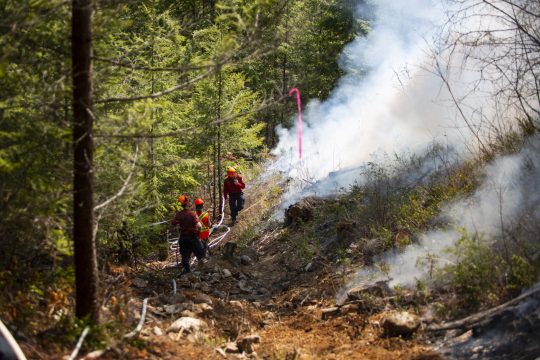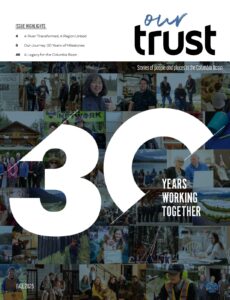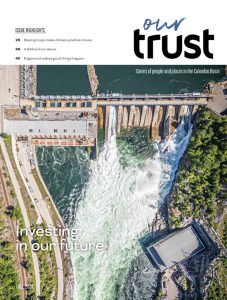Basin youth learn how to channel their passion into action.
Life in the Basin is ingrained with nature, whether this involves camping, kayaking or simply waking to the sounds of birdsong. It’s no wonder that Basin youth are inspired to protect their local landscapes by getting involved with climate action.



Driven by the desire to preserve their healthy surroundings, a group of 10 volunteer high school students from across the Basin planned events to rally youth for climate action awareness: the Climate Action Forum and its follow-up, the Food and Climate Action Workshop.
“It was super inspiring for me to sit in on the Climate Action Forum and realize how many youth in the Basin are engaged in climate action,” says Leeza Perehudoff, one of the forum’s presenters. “To me it felt like my message was heard because of their awesome engagement with the questions that I posed to them.”
Sparked by their surroundings
The forum, held on February 23, 2022, was a unique climate leadership development opportunity for Basin youth aged 14 to 18. The goal was to connect with, learn about and be inspired by the many opportunities and pathways of climate action. To attend it, 80 participants gathered at their respective communities’ youth networks and then tuned into the online event.
The event was made possible by the Basin Youth Network, which Columbia Basin Trust launched in 2016 to help communities in the region increase local activities and opportunities for youth, enabling them to learn new skills and engage with each other and their communities.
Five presenters signed on from across the country, from Castlegar to Ottawa. Topics included fostering climate dialogue, Indigenous clean energy and how businesses can address climate action.
Another topic—how research and data can inform individuals’ actions in supporting climate justice—was brought up by presenter Leeza Perehudoff, who grew up in Castlegar and is currently a graduate student supporting rural resilience research at Selkirk College. Like many of the youth who attended the forum, she, too, was inspired by the wilderness of the Kootenays, which triggered her interest in environmental studies.




The forum was her first opportunity to connect with youth through the Basin Youth Network, and she was amazed at the level of participation. She says that the youth eagerly contributed to the virtual chat, during which she posed the question of who was most at risk for the impacts of climate change.
“They reflected on humans, and different demographics like seniors and youth, and really how different disturbances affect us all, like flood and fire,” she says.
The youth also reflected on climate change’s impact on animals, food security and community members with compromised health.
Getting nitty gritty about food solutions
The forum’s youth organizers also wanted to go one step further; they wanted Basin youth to brainstorm real-life climate action solutions for local situations.
On March 2, 2022, the Food and Climate Action Workshop was held as another hybrid in-person and virtual event, hosted by the Starfish, a non-profit that connects young environmental leaders with a platform for storytelling and a community of change-makers. Twenty-two participants discussed how everyday actions impact other aspects of life around them, specifically when it comes to food.
“It was all around food, food production and food waste and how that has an impact on climate change,” says Mike Kent, Basin Youth Network Regional Coordinator. “Small groups looked at different aspects of that and brainstormed potential solutions.”
Participants watched four videos that captured different challenges around food production: global land use, household waste and composting, soil health and regional equitable practices. They then used virtual bulletin boards to brainstorm and debate dozens of ideas on how to optimize local land for healthy soil and food, support local food production and create a better global food system. Many of the ideas focused on what individuals in a community can do, such as buy local, compost, and reuse or avoid abundant food packaging.
“One small action can add up to a really big change.”
Leeza Perehudoff

















